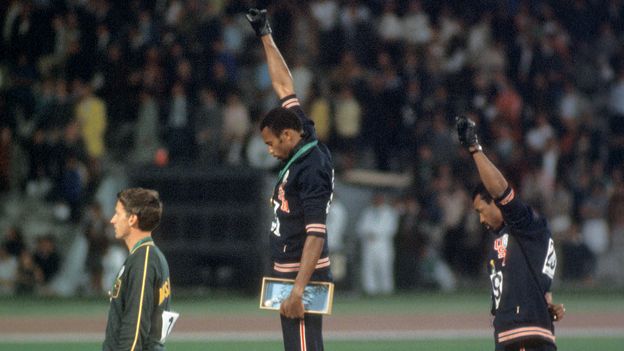
On 16 October 1968, two black US athletes – Tommie Smith and John Carlos – stood on the podium at the Mexico City Olympics, heads bowed. They wore black socks with no shoes; Smith wore a black scarf around his neck. As the US national anthem played, they each raised a black-gloved hand in silent protest.
More like this:
– One of the US’s biggest mysteries
– The hit song that has divided the US
– An inside look at the real Rupert Murdoch
Although no words were spoken, the moment was full of meaning. Smith, who had won gold in the 200m, setting a new world record, raised his right fist to represent Black Power. Bronze medallist Carlos, wearing a bead necklace to symbolise the lynchings of black Americans, raised his left fist to represent black unity. The scarf stood for black pride and the socks with no shoes represented African-American poverty.
In History
In History is a series which uses the BBC’s unique audio and video archive to explore historical events that still resonate today
The Black Power salute, as it came to be known, was a defiant statement against the systemic oppression of black people in the US and marked a defining moment in the history of civil rights activism. But their use of it on 16 October 1968 came at great personal cost to the athletes involved. Within hours, they were condemned by the International Olympic Committee. Two days later, they were suspended from the US team and sent home. And as these exclusive BBC archive clips show, Smith paid a heavy price – both personally and professionally – in the years to come.
Born into poverty in Texas in 1944, the seventh of 12 children, Smith had grown up seeing first-hand the racism of the segregated US South. Despite suffering pneumonia as a child, he had developed into a gifted athlete and by 1968 was the standout sprinter at San Jose State University in California, getting selected to represent the US in that summer’s Olympics.
It was a year of intense political and social turmoil: the Vietnam War and the anti-war movement were in full swing, and the Civil Rights Movement had made the struggle for racial equality one of the defining issues of the era. In April, Dr Martin Luther King Jr had been murdered by a white gunman in Memphis, and presidential candidate Robert Kennedy was assassinated in Los Angeles a little over two months later. The period leading up to the 1968 Olympics was punctuated by widespread unrest. Many black athletes felt a deep sense of anger and frustration at the injustices they were facing every day.
In the wake of the protest, Smith and Carlos were vilified by much of the media and shunned by the US sporting establishment. In the years that followed, they were subjected to abuse and death threats. Smith attributed the break-up of his marriage to the stress of dealing with the fallout. When he should have been at the peak of his career, the US Olympic committee banned him from national and international competitions. By 1972, instead of preparing for the Munich Olympics, Smith, who was still the fastest man in the world, was reduced to training schoolchildren in Wakefield in northern England to earn a living.
Sport was one of the few areas where the ability of the individual could triumph over the barriers faced by black Americans, Smith explains in this BBC archive video. “The black athlete… has grown to know that the body could be a springboard to success. I think he works doubly hard at that as he would at anything else. Because in athletics, especially track and field, nobody can say you are no good. The only person who can say that is that clock,” he says.
Despite the hardships he endured, Smith continued to speak out for social justice and equality. He completed a master’s degree in sociology in 1974 and moved into teaching and athletics coaching, becoming a prominent advocate for racial equality in sport and society.
In 2008, Smith and Carlos were honoured with the Arthur Ashe Courage Award, which is presented annually to individuals whose contributions “transcend sports”. US President Barack Obama said of the pair: “Their powerful silent protest in the 1968 Games was controversial, but it woke folks up and created greater opportunity for those that followed.”
When asked by BBC Newsnight In 2012 if he regretted the salute, Smith said: “The only regret was that it had to be done”.